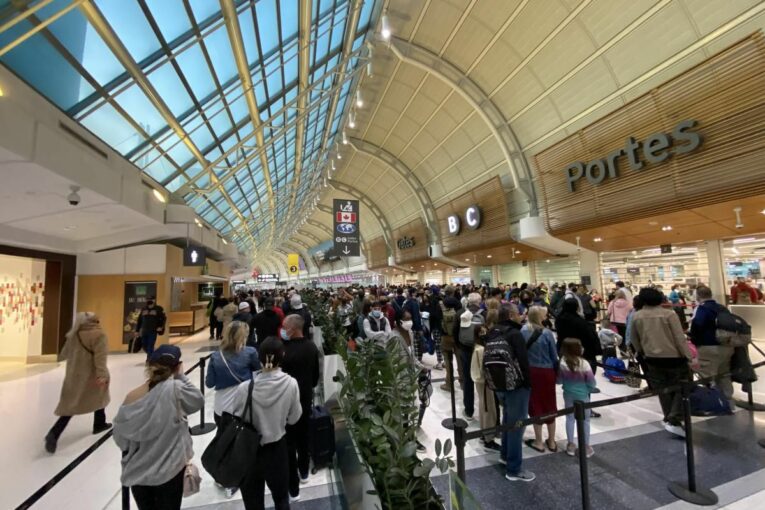
[ad_1]
.
6:45 a.m. Canada’s largest food retailer has just had a banner quarter and critics say it’s yet another example of a company profiting from inflation.
Loblaw Companies Ltd. said Wednesday its first-quarter profit was up almost 40 per cent compared to the same period last year. Taking into account a tax ruling that went in its favour as well as other adjustments, its net earnings were up 17.1 per cent to $459 million.
Most of its retail profit growth came from its drugstore retailers (it owns Shoppers Drug Mart and Parmaprix), Loblaw said, owing to higher sales of prescription drugs, over-the-counter cough and cold medications, and cosmetics, which got a boost as pandemic restrictions loosened.
Read the full story from the Star’s Christine Dobby.
6:41 a.m. The State Department said Wednesday that Secretary of State Antony Blinken has tested positive for COVID-19 after attending the White House Correspondents’ Dinner and related events over the weekend.
Spokesman Ned Price said Blinken tested positive in a PCR test on Wednesday afternoon. Price said Blinken is fully vaccinated and is experiencing only mild symptoms.
Blinken tested negative Tuesday and again earlier Wednesday morning with antigen tests but took the PCR test after developing symptoms. Blinken has not met in person with President Joe Biden for “several days” and is not considered a close contact of the president, according to the White House and State Department.
6:40 a.m. Coronavirus cases are continuing to increase in California, prompting one health official to warn that the state is heading into the next wave of the pandemic.
California has seen its coronavirus case rate rise by 10% in the past week, from 5,700 new cases a day to 6,300. Health experts note, however, that the official numbers may be a significant undercount, given the now-widespread availability of at-home tests — the results of which are not reliably reported to health agencies.
And while still at relatively low levels, statewide coronavirus-positive hospitalizations have risen for eight consecutive days: from 950 to just above 1,100.
The number of COVID-19 patients needing intensive care has also risen from a record low last month, but it remains at one of the lowest levels of the entire pandemic. It is still unclear, however, how serious this new uptick will be.
6:40 a.m. China is slowly beefing up restrictions in Beijing and continuing a punishing lockdown in Shanghai as it tries to control the spread of COVID in the world’s most populous country, an approach the top U.S. infectious disease doctor criticized as ineffectual.
There were 4,651 infections reported Thursday in Shanghai, including 34 in the community, defying a lockdown that has confined residents to their homes for more than a month. The city won’t ease restrictions until cases in the community reach zero for three days in a row, officials said.
Beijing posted 50 cases, its 12th double-digit day, while the central Chinese city Zhengzhou announced a snap lockdown designed to cripple transmission of the pathogen. Officials in the provincial capital of Henan province, which hosts a massive iPhone factory, hope the early introduction of sweeping curbs will bring its flare-up under control in about a week’s time.
Officials are living up to their zero tolerance vow, despite the impact it’s having on the economy and quality of life. The lockdowns are unlikely to be successful in the long-term because the government isn’t using the time to boost vaccination rates among the highest-risk elderly, and the shots it is delivering are less effective, White House medical adviser Anthony Fauci told a German talk show.
Lockdowns must be used to prepare the population to prevent the future spread of infection, Fauci said on the Maischberger show. Doing a lockdown and nothing else is a strategy that doesn’t work, he said.
6:39 a.m. North Korea on Thursday lifted a temporary lockdown it had imposed a day earlier after reports from across the country of cases of fevers of unknown origins, Yonhap News Agency reported, citing multiple South Korean government officials.
The brief lockdown followed a military parade last week marking the anniversary of the founding of its army. Pyongyang also held festivities a few weeks ago for the 110th birth anniversary of state founder Kim Il Sung — the grandfather of current leader Kim Jong Un — where the country organized mass events despite maintaining strict COVID-19 border closures in place since early 2020.
It was unclear which parts of the country were under the daylong lockdown. There is speculation, the fever cases were caused by water-borne diseases such as typhoid because a coronavirus infection would have prompted more stringent curbs, according to Yonhap.
6:38 a.m. Outside of southern Africa, new COVID-19 cases on the continent remain low, according to the Africa Centers for Disease Control and Prevention.
South Africa is reporting the most weekly new cases, Africa CDC Deputy Director Ahmed Ogwell Ouma told reporters Thursday in a virtual briefing. In most of the African countries that are experiencing a fifth wave, it’s more severe than previous ones, he said.
In the past week, 85 virus deaths were reported across the continent, down from 207 the previous week. So far, 11 African countries have experienced a fifth wave.
South Africa’s daily coronavirus test positivity rate on Wednesday rose to its highest level yet of its fifth wave of infections.
6:38 a.m. The Alberta government says it is making a pill to treat COVID-19 more accessible by allowing doctors and other health-care workers to prescribe the drug.
Health Minister Jason Copping says positive COVID-19 rapid tests will also be accepted for Paxlovid to be prescribed.
People eligible for the oral medication include unvaccinated people over the age of 55, unvaccinated Indigenous people over 45, adults with some pre-existing health conditions, pregnant women and those who are immunocompromised.
Copping says treatment should begin within five days of the onset of COVID-19 symptoms.
6:35 a.m. British Columbia has almost caught up with the backlog of surgeries from the pandemic and weather events while it sets new targets to whittle down the existing waiting lists, says the province’s health minister.
Adrian Dix said the whole system had performed exceptionally well, considering the circumstances of the pandemic and last year’s weather events.
“The word to use to describe our Year 2 performance is the same word used to describe our Year 1 performance: stunning,” he told a news conference Wednesday.
However, nurses and some doctors who perform what are classified as elective surgeries, said the push to wipe out the backlog has led to worker burnout, while the delay for procedures like hip and knee replacement has stretched into years.
The province had completed 99.8 per cent of surgeries that were postponed up to the fifth wave of COVID-19 and weather events such as the heat wave and floods last year, he said.
More than 52,000 urgent scheduled surgeries were completed last year, while another 72,549 unscheduled procedures were performed because Dix said the government greatly increased operating room hours.
[ad_2]
You can read more of the news on source



